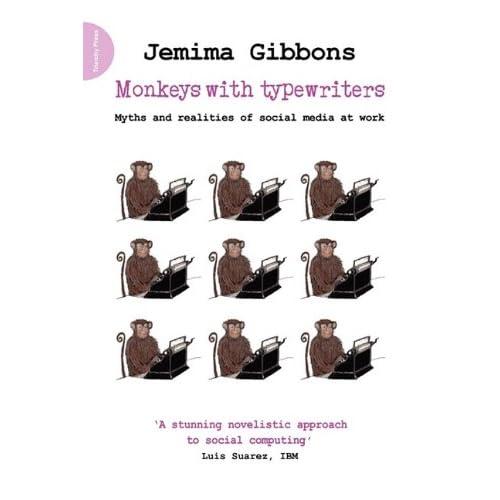I went to Essex University with Jemima Gibbons. In fact, we were both elected to serve on the same small editorial committee of Vulture, the student union rag. I’d tell you what year that was. But I'm too much of a gentleman…
We found each other again less than a year ago. Via Twitter, naturally. She came along to a hastily arranged tweet-up in Camden Town – which was where she told me about the book she was completing. Had we stumbled upon each other earlier Jemmia says I'd likely have played a cameo in Monkeys With Typewriters myself (insert your own gags here).
Jemima’s book is “a novelistic approach to social computing” according to Luis Suarez.
It certainly has a story-telling quality – scenes described, images evoked.
I’ll admit it wasn’t an approach I was comfortable with at first, but it grew on me – and I found myself drawn in attracted by the page-turning storyness of it.
It’s a story in which I happen to know a great many of the characters. ‘Social’ is a relatively small world – particularly in London where the majority of the plot unfolds. Perhaps that added to the fascination… I kept reading on looking out for the next friend to get a mention…
Sometimes there is more story-telling description than actual insight – but that’s not altogether a bad thing.
Many, when faced with creating a mass media portrayal of the interwebs (book, magazine article, latest BBC4 TV series…) default to a way of describing aA Big Thing that it is out to do and who is out to do this big thing and to whom – very centre-out notions and essentially a broadcast approach.
The reality is the web is what it is. It is all of us. It is what each of us makes it. It is what emerges from our interactions. There is no grand plan, there is no editorial committee…
Jemima’s approach (and the clue is in the title, Monkeys With Typewriters… brave when your surname is Gibbons) is much closer to the latter ‘reality’.
It’s a guide book for those in organisations coming to terms with the shifting sands beneath their feet (as hierarchy and central control are swept away and improved upon by adhoc self-forming communities of purpose).
And it’s a guide book that is more practical than most, coming complete with buzzword demystification and a 30-step guide to ‘getting social’ thrown in.
If you’ve spent a lot of time thinking about the impact of group forming network theory then this is probably not the book for you. But if you’re just starting to understand that everything the network touches it will disrupt, then Monkey’s With Typewriters will set you on the right path without making your brain bleed. And we all know someone who could do with that.


![Reblog this post [with Zemanta]](http://img.zemanta.com/reblog_e.png?x-id=f81060ec-e7d4-4d3a-84c6-69863b404a16)
Hi Dave,
ReplyDeleteThanks for this review. I'm so glad you enjoyed the book. Monkeys with Typewriters started out as a series of blog posts, which were in turn based on the 50+ interviews I carried out. Each blog post was meant to be a kind of self-contained vignette, so that's where the story-telling element comes in: I wanted to produce something that was entertaining, easy-to-read and not to prescriptive.
You're completely right about resisting the temptation to analyse to death and come up with a Next Big Thing format or concept. In the end I did come away with a light framework (outlined by the six chapter headings), but I hope that's not too indigestible.
Thanks so much for reading and appreciating!
Jemima :)